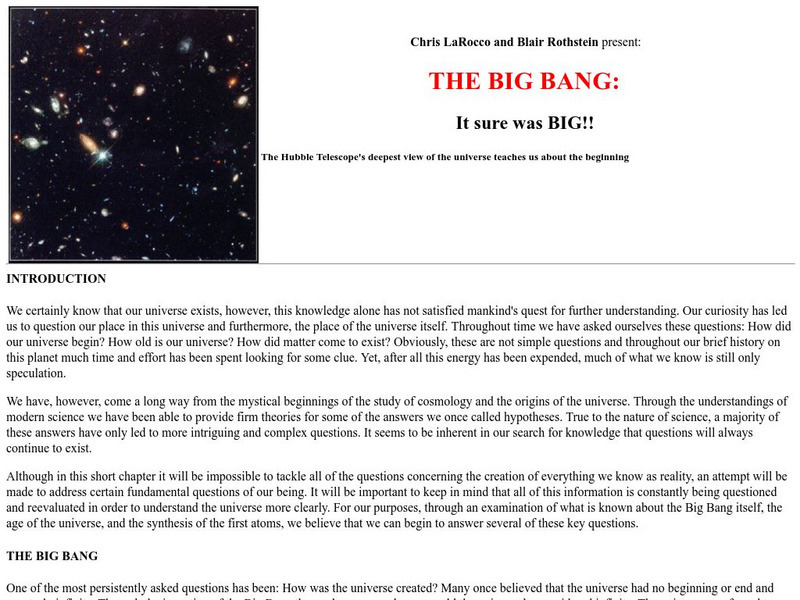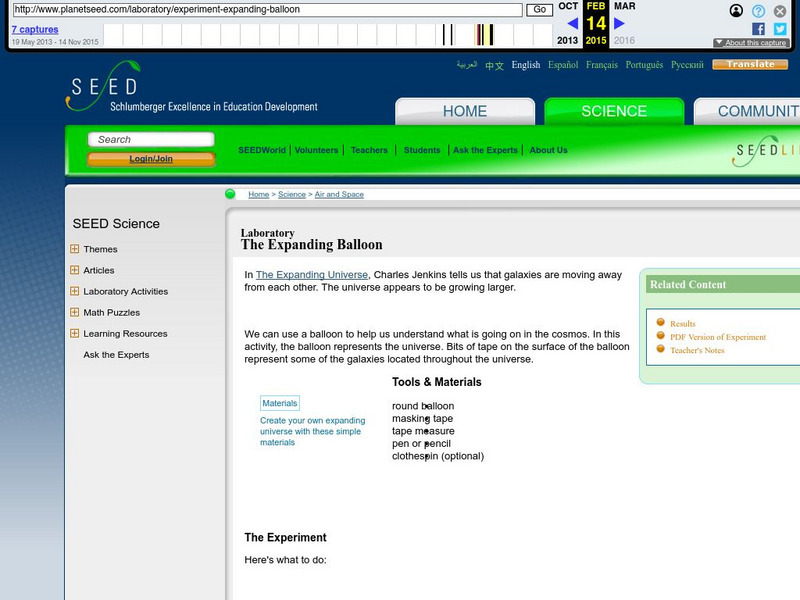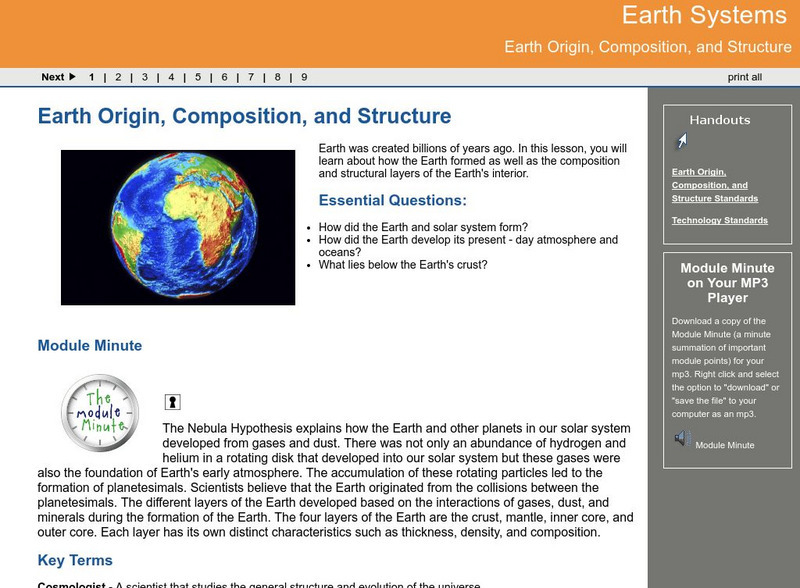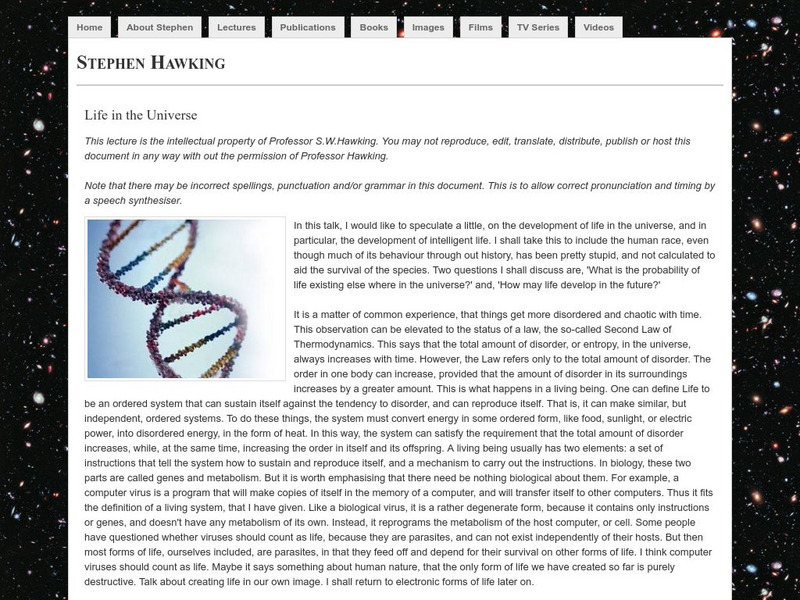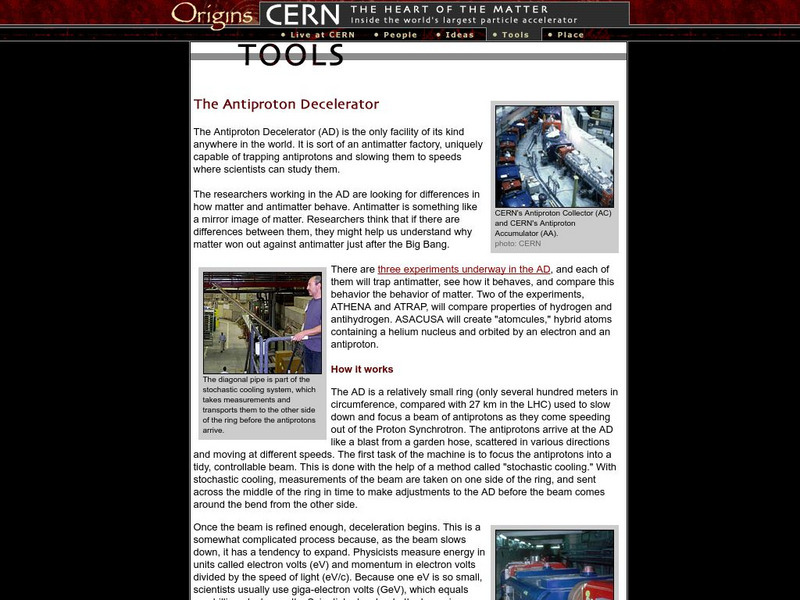Hi, what do you want to do?
Curated OER
Learning from Light: The Big Bang
Students explore what astronomers are able to examine our galaxy and universe by examining light. They explore in this sub-unit the formation of the universe, commonly called "The Big Bang," and it follows studying from the Light: The...
Curated OER
Bang! You're Alive
Students explore the Big Bang Theory and the Theory of Plate Tectonics. In this history of life lesson, students explain two ways the Theory of Plate Tectonics and the Big Bang are of direct benefits to humans.
Curated OER
What a Cosmic Web We Weave
Students explore, using journals and discussion in small groups, how the universe has evolved since the theoretical Big Bang and create dramatizations of various eras in cosmic evolution.
Curated OER
The Big Bang
Fifth graders relate the elements in the human body to those produced during a supernova. In this space science and chemistry lesson, 5th graders listen to a lecture and view visuals about the big bang. They relate the production of...
Curated OER
Who Ever Heard of the Big Bang?
Students examine the theories that attempt to explain the origins of the Universe. Some theories are based on scientific facts. Others find their source in folklore. The variety of beliefs systems are discussed as a motivating factor for...
Exploratorium
Exploratorium: Cern: Antimatter
A wonderfully written non-technical introduction to antimatter, as well as a brief discussion of the investigation into the asymmetry between the quantities of matter and antimatter observed in our universe.
PBS
Pbs Learning Media: Wmap: "Baby Picture" of the Universe
View the Wilkinson Microwave Anisotropy Probe (WMAP) image from NASA to see the first detailed map of the oldest light in the universe, from 379,000 years after the Big Bang, over 13 billion years ago. A second image offers a visual...
PBS
Pbs Learning Media: Relativity and the Cosmos
This illustrated essay from the NOVA Web site introduces the basic concepts of Einstein's General Theory of Relativity and what we know about cosmology as a result.
University of Michigan
University of Michigan: The Big Bang It Sure Was Big!
A detailed examination of "what is known about the Big Bang itself, the age of the universe, and the synthesis of the first atoms."
ACT360 Media
Act Den: Sky Den
This journey will help you solve big questions about the universe. You will be able to see beyond human capabilities and will learn what scientists are discovering.
Other
The Expanding Balloon Experiment
Great science experiment to help aide in the understanding of the Big Bang Theory. Students are able to complete this experiment with little materials and individually.
Georgia Department of Education
Ga Virtual Learning: Cosmology
This interactive module will help students understand cosmology. Learn about the standard cosmological model and explore if life is possible in other places besides the Earth.
Georgia Department of Education
Ga Virtual Learning: Earth Origin, Composition, and Structure
In this lesson, you will learn about how the Earth formed as well as the composition and structural layers of the Earth's interior.
American Academy of Achievement
Academy of Achievement: John C. Mather, ph.d.
A biography of John C. Mather, winner of the Nobel Prize in Physics for his work in astrophysics. He persuaded NASA to build and launch the Cosmic Background Explorer satellite (COBE), which was able to send back information that...
Other
Astronomical Society of the Pacific: Cosmic Calendar [Pdf]
An activity where young scholars create a timeline of the history of the Universe, beginning with the Big Bang almost 14 billion years ago, but compress it into one year. Younger students must be able to order events, while older young...
Khan Academy
Khan Academy: Infographic: Timeline
An all-encompassing historical timeline from the Big Bang Theory to modern-day. PDF is available to download.
Other
Stephen W. Hawking: Lectures: Life in the Universe
This lecture covers the topic of life now and into the future, including the role genetic engineering will play.
Exploratorium
Exploratorium: Cern: The Antiproton Decelerator
Explains the function of the Antiproton Decelerator, a device at the European Center for Nuclear Research used to "slow down" bunches of antiprotons for use in experiments.
American Museum of Natural History
American Museum of Natural History: O Logy: How Did the Universe Begin?
Bite-size introduction to two scientists-Hubble and Lemaitre-who played key roles in formulating the theory of the origin of the universe known as the big bang. Includes an interactive timeline on which you can plot out the approximate...
TED Talks
Ted: Ted Ed: What Happened to Antimatter?
CERN scientist Rolf Landua returns to the seconds after the Big Bang to explain the disparity that allows humans to exist today. [5:16]
TED Talks
Ted: Ted Ed: The Beginning of the Universe, for Beginners
How did the universe begin and how is it expanding? CERN physicist Tom Whyntie shows how cosmologists and particle physicists explore these questions by replicating the heat, energy, and activity of the first few seconds of our universe,...
PBS
Pbs Teachers:origins Back to the Beginning
This hour long program by NOVA is split into six segments and examines a issues influencing scientists' current understanding of how the universe was formed. This includes The Big Bang and its lasting effects.
CK-12 Foundation
Ck 12: Biology: How Earth Formed
[Free Registration/Login may be required to access all resource tools.] Describes the Earth's formation.
CK-12 Foundation
Ck 12: Biology: How Earth Formed
[Free Registration/Login may be required to access all resource tools.] Describes the Earth's formation.












